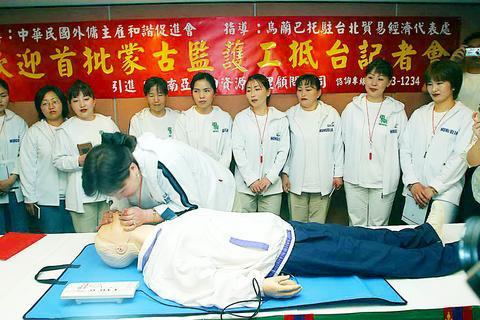The first group of caregivers hired from Mongolia are all well-educated, including experienced nurses and several high school teachers, a local manpower agent said yesterday.
The first group of 11 Mongolian caregivers arrived last week and 10 of them have university degrees, the manpower agent said.
The Council of Labor Affairs formally opened the job market to Mongolians on Jan. 19.

PHOTO: ROC FOREIGN LABOR AND EMPLOYER HARMONY PROMOTION COMMITTE
All of the 11 Mongolian workers met the media at a news conference yesterday. All of them are women, with an average age of 30.
Dagba Batmunkh, director of the Ulaanbaatar Trade and Economic Representative Office in Taipei and Dolgoryn Sukhbaatar, a department chief at Mongolia's Social Welfare and Labor Affairs Ministry, were also present at the news conference.
Sukhbaatar said more than 7,000 Mongolians have filed applications to work in Taiwan and about 1,000 of them have received Chinese language training.
The second batch of Mongolian workers are scheduled to arrive in Taiwan on June 1, Sukhbaatar said, adding that he hoped the number of Mongolians working in Taiwan can reach 10,000 by next May.
Batmunkh said Mongolia's per capita national income is only about US$450. To the best of his understanding, Batmunkh said, many of his compatriots look forward to working in Taiwan.
"Most Mongolian people are competent and I'm hopeful that labor affairs cooperation between our two countries will proceed smoothly and satisfactorily," Batmunkh said.
Chou Shao-chuan (
"The Mongolian government is more willing to help verify the personal backgrounds of Mongolian applicants," Chou said, adding that it usually takes three to four months for local employers to complete formalities for importing Vietnamese and Indonesian workers.
The first group of Mongolian caregivers include a nurse with 11 years experience at a Mongolian hospital and even several high-school teachers.
A 30-year-old former high school teacher, known as Sulun, said her monthly salary in Mongolia is slightly more than US$70 or around NT$2,400.
"I hope to earn more money during my three years of work in Taiwan. I want to save money so that I can buy a house when I return home," Sulun said, adding that she also hopes to improve her Chinese proficiency during her stay in Taiwan.
Sulun has studied Chinese for three years.
Sulun's husband is a physical education teacher.
"If my work in Taiwan goes well, my husband may also apply to work here," she added.

‘DENIAL DEFENSE’: The US would increase its military presence with uncrewed ships, and submarines, while boosting defense in the Indo-Pacific, a Pete Hegseth memo said The US is reorienting its military strategy to focus primarily on deterring a potential Chinese invasion of Taiwan, a memo signed by US Secretary of Defense Pete Hegseth showed. The memo also called on Taiwan to increase its defense spending. The document, known as the “Interim National Defense Strategic Guidance,” was distributed this month and detailed the national defense plans of US President Donald Trump’s administration, an article in the Washington Post said on Saturday. It outlines how the US can prepare for a potential war with China and defend itself from threats in the “near abroad,” including Greenland and the Panama

A wild live dugong was found in Taiwan for the first time in 88 years, after it was accidentally caught by a fisher’s net on Tuesday in Yilan County’s Fenniaolin (粉鳥林). This is the first sighting of the species in Taiwan since 1937, having already been considered “extinct” in the country and considered as “vulnerable” by the International Union for Conservation of Nature. A fisher surnamed Chen (陳) went to Fenniaolin to collect the fish in his netting, but instead caught a 3m long, 500kg dugong. The fisher released the animal back into the wild, not realizing it was an endangered species at

The High Prosecutors’ Office yesterday withdrew an appeal against the acquittal of a former bank manager 22 years after his death, marking Taiwan’s first instance of prosecutors rendering posthumous justice to a wrongfully convicted defendant. Chu Ching-en (諸慶恩) — formerly a manager at the Taipei branch of BNP Paribas — was in 1999 accused by Weng Mao-chung (翁茂鍾), then-president of Chia Her Industrial Co, of forging a request for a fixed deposit of US$10 million by I-Hwa Industrial Co, a subsidiary of Chia Her, which was used as collateral. Chu was ruled not guilty in the first trial, but was found guilty

DEADLOCK: As the commission is unable to forum a quorum to review license renewal applications, the channel operators are not at fault and can air past their license date The National Communications Commission (NCC) yesterday said that the Public Television Service (PTS) and 36 other television and radio broadcasters could continue airing, despite the commission’s inability to meet a quorum to review their license renewal applications. The licenses of PTS and the other channels are set to expire between this month and June. The National Communications Commission Organization Act (國家通訊傳播委員會組織法) stipulates that the commission must meet the mandated quorum of four to hold a valid meeting. The seven-member commission currently has only three commissioners. “We have informed the channel operators of the progress we have made in reviewing their license renewal applications, and